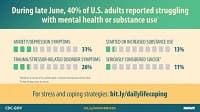
Fewer Acute Mental Health Care Admissions During the COVID-19 Pandemic
Oct 20 2020
According to new research, admissions to an acute adult mental health unit in Leicester, U.K. decreased in the month following enactment of COVID-19 quarantine and travel measures. Researchers compared admissions to similar periods in 2018 and 2019. A higher percentage of patients admitted in early 2020 were diagnosed with schizophrenia or bipolar disorder, and a lower percentage with anxiety or depression, compared to prior years. The study represents just one look at mental health service use in the context of pandemic-related restrictions; additional research is needed to understand the full effect of COVID-19 on mental health systems. To learn more, see the study in Psychiatric Services.

Combining Medication and Skills-Based Therapy More Effective than Treatment as Usual in Bipolar Disorder
Oct 14 2020
Finding the right treatment for bipolar disorder can be a challenging process. But according to new research, a combination approach involving medication and standardized, skills-based therapy may be a good place to start. Researchers conducted a systematic review and meta-analysis of 39 clinical trials comparing treatment with medication plus various types of psychotherapy to treatment with medication plus a control intervention. When combined with medication therapy, psychoeducation, family, and cognitive behavioral therapy were associated with a reduction in episode recurrence. Additionally, cognitive behavioral therapy was associated with a greater stabilization of depressive symptoms. To learn more, see the study in JAMA Psychiatry.

Brief Interventions in Acute Care Settings Reduce Suicide Attempts, Improve Follow-Up Care
Sep 16 2020
Research has shown that half of individuals who die by suicide had seen a health care provider in the past month. By directly addressing risk factors and connecting people to supportive care, health care providers can make a difference. A new study shows that brief interventions like safety planning, coordinating outpatient mental health appointments, and conducting follow-up phone calls significantly reduce subsequent suicide attempts. The research demonstrates that these interventions are effective in hospitals, urgent care, and emergency departments and highlights the importance of screening for suicide risk at health care appointments. To learn more, see the NIMH website.

New Public-Private Partnership Commits to Collaborative Research on Schizophrenia
Sep 15 2020
Early diagnosis and treatment are critical to reduce the negative long-term outcomes of schizophrenia. Past research has made it easier to identify individuals who are at high risk for developing schizophrenia, but translating this knowledge into treatment requires further complex investigation. Recognizing the importance of this research, and the large scale of investment and collaboration required, the Foundation for the National Institutes of Health has launched an Accelerating Medicines Partnership on Schizophrenia. This five-year program brings together federal, not-for-profit and private organizations dedicated to working together to advance our understanding and develop targeted interventions for high-risk populations. To learn more, see the FNIH website.

Nearly Half of U.S. Adults Report Mental Health, Substance Use Concerns During COVID-19 Pandemic
Aug 14 2020
The COVID-19 pandemic continues to affect us all in different ways, and a new survey highlights its significant impacts on the mental health of U.S. adults. Approximately 41% of participants reported at least one mental health or substance use issue, with higher rates among specific groups. Over 25% of respondents aged 18-24 and 20% of essential workers reported that they had seriously considered suicide in the past month. Recognizing how common these concerns are is a critical step to helping those who are in significant need of treatment and support. To learn more, see the report from the Centers for Disease Control and Prevention.

New Evidence Supports the Effectiveness of Yoga to Improve Generalized Anxiety
Aug 12 2020
Many people use complementary and alternative practices to support their health and wellbeing, but these practices often have limited supporting evidence. A new study compared three interventions for Generalized Anxiety Disorder — Kundalini yoga, stress management education, and cognitive behavioral therapy (CBT). CBT was overall the most effective treatment and had the strongest long-term effects, but yoga meaningfully improved symptoms for more than half of participants after three months of practice. Although it was not shown to be more effective than CBT, yoga is easily accessible for many people and may be a valuable practice for individuals with anxiety. To learn more, see the study in JAMA Psychiatry.

Study Shows Specific Causes, Potential Intervention Points for Post-Traumatic Stress in Police Officers
Aug 11 2020
Using a series of statistical analyses known as computational causal discovery, researchers have identified five direct causes of post-traumatic stress in early-career police officers. Participants completed a comprehensive set of clinical, genetic, physical, and self-report assessments during their academy training with follow-up after 12 months of service. Although the 200 officers who experienced post-traumatic stress had diverse experiences during that year, they shared at least one of five specific behavioral or genetic factors. This information may allow the development of targeted interventions to reduce the risk of post-traumatic stress disorder. To learn more, see the study in Translational Psychiatry.

Long-Acting Injectable Antipsychotics Reduce Hospitalizations In Early Schizophrenia
Jul 15 2020
For individuals with schizophrenia who struggle to maintain regular treatment, long-acting injectable antipsychotics (LAIs) may be a valuable option. A new study indicates that LAIs may be especially beneficial as an early treatment. Among individuals who had been receiving antipsychotic therapy for fewer than five years, psychiatric hospitalization was less common for those treated with an LAI compared to typical treatment. Reducing the chances of relapse and hospitalization for those with early-phase schizophrenia is an important step to supporting recovery. To learn more, see the study in JAMA Psychiatry.

Cognitive Behavioral Therapy For Depression More Effective When Delivered Virtually
Jul 09 2020
As the COVID-19 pandemic has led to a significant increase in use of teletherapy, it is critical to measure the effectiveness of online and virtual treatment tools. A new analysis shows that cognitive therapy (CBT) for depression may actually be more effective when it is delivered virtually compared to a traditional face-to-face setting. Across 17 studies conducted in six countries, participants reported greater improvement in symptoms and no change in satisfaction when they connected with their therapists through web-based applications, video-conferencing, email and text messaging. To learn more, see the study in EClinicalMedicine.

Depression Is Strongly Associated With Heart Disease Worldwide
Jun 10 2020
New research suggests that depression may be just as important as smoking or high cholesterol in predicting a person’s risk of heart disease. A global study with more than 145,000 participants shows that cardiovascular disease and heart attacks are up to 20% more common in people with depression. The risk is even higher for men, and for people living in urban areas. This evidence strongly supports the need to integrate physical health and mental health treatment to support overall wellness. To learn more, see the study in JAMA Psychiatry.